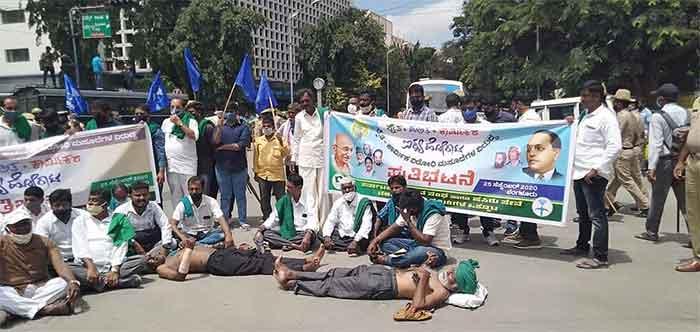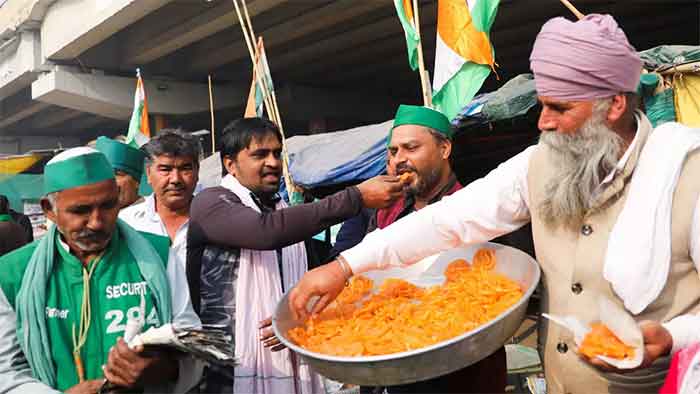
India is seeing multiple protests by its farmers, citizens and lawmakers. People are coming out on the streets as they are no longer afraid of the pandemic, but are more threatened by the new laws that the Indian parliament is imposing on them.
While the ruling party pleads that each of these laws are aimed at welfare of the people, it is quite evident that the same people are the ones showing their anger through protests and social media campaigns. The recent farming related bills that have been passed in both the Lok Sabha and Rajya Sabha, but awaits the assent of the president, has drawn a lot of criticism from those who are supposed to benefit from it.
It is claimed, that the three bills namely, the Farmers’ Produce Trade and Commerce (Promotion and Facilitation) Bill, 2020 and the Farmers (Empowerment and Protection) Agreement of Price Assurance and Farm Services Bill, 2020 and Essential Commodities (Amendment) Bill will help take the farmer’s products to the open market. The government claims that these bills will help in accelerating the growth through private sector investment in infrastructure and will also help getting the products to national and global markets.
The bills allow farmers to sell their products outside the Agricultural Products Marketing Corporation (APMC) mandis to any player that wants to buy their produce. Also the farmers can get into contracts with large agri-firms and sell their produce on pre-agreed prices. Products like cereals, pulses, edible oils, onions and potatoes have been removed from the list of essential commodities, which means they will not come under any form of price control. Also the new laws will end the imposition of stock holding limits on agricultural products by private businesses, except only under extraordinary situations.
Farmers currently sell their products to the APMC through commission agents and the new law attempts to take these two players out of the picture, when it comes to farmers selling their produce. Some may argue that these are clearly laws that have been passed with a good intent. It is important however, that we dive much deeper beyond the headlines.
The main aim of the government , in passing these laws, is to remove the Minimum Support Price regime which has been in place for many years, to help farmers get better prices for their produce. In 2014, the BJP said in its election manifesto that it would increase the MSP to 50% of the cost of production, however since getting elected it has backtracked on this promise.
When the Consortium of Indian Farmers Association filed a petition seeking the implementation of the Oct 4, 2006 final report of the National Commission on Farmers headed, the Centre, on 20 Feb, 2015, in response to the above said petition said “it could not accept fixing the MSP for agricultural produce as it would distort the market and unsettle it”. Again, in 2018, the central government claimed it had increased the MSP of rabi crops by 50 percent of cost of production, this turned out to be a fake promise, as reported by the news magazine Frontline.
These experiences show that the assurance of MSP given by the current government to agitating farmers may be denied in future. There are other instances of such false assurances given by the regime in the past. For example, the Modi government had said that subsidy for LPG would be transferred directly into the account of the consumers rather than giving it at the time of purchase. There were critics of this idea who pointed out that eventually the subsidy will be eliminated. We can see that happening now, as the government recently announced that it will eliminate the LPG subsidy, as the difference between subsidised and non-subsidised cylinders has become marginal.
The end of imposition of limits on stock piling of agricultural products will give an advantage to big corporates as they can manipulate the prices of commodities in the market, according to their wish, to increase their profits. The open market also doesn’t know the difference between big farmers and small ones. Under the new laws the small and marginal farmers will end up losing to the big ones. What the government is doing is to essentially corporatize all of Indian agriculture itself, a sector of the economy which needs regulation by the state more than many other sectors.
How will this affect everyone in the country? India for many decades has had a Public Distribution System aimed at providing food products at low prices to those who couldn’t afford them otherwise. The government has been buying these food commodities from the farmers to supply the PDS system. If the farmer goes directly to the open market, the only way the government can still help the poor is by procuring food grains from some big corporations to ensure availability in the PDS network.
The new Essential Commodities Bill will also affect the prices of basic food items that are a staple part of people’s diets in many parts of the country. The ruling government has clearly shown through this law that it cares only for the profits of big traders and corporations and not for the welfare of a majority of Indian citizens.
The government should focus on overhauling the existing APMC procurement system while providing justifiable MSP prices for farmers, which is their right and not a favour being done to them. Farmers and indeed the entire rural population have been subsidising the urban populations of India for decades. Providing a MSP for farm products is the minimum that India can do to repay farmers for the great service they have done to the entire country.
However, measures such as MSP are also not going to be enough to solve the crisis of Indian agriculture. The government should try to improve the state of local, rural economies through greater investments in infrastructure, health, education rather than forcing the migration of rural populations by bringing out laws like the ones recently passed in parliament. Strengthening local economies will also enable the country to deal with many other problems, in particular that of climate change.
Umamaheswaran V. is a post graduate in physics and lives in Tiruchirappalli, Tamil Nadu. He is a keen observer of social and political affairs in the state and also nationally.
SIGN UP FOR COUNTERCURRENTS DAILY NEWSLETTER














































